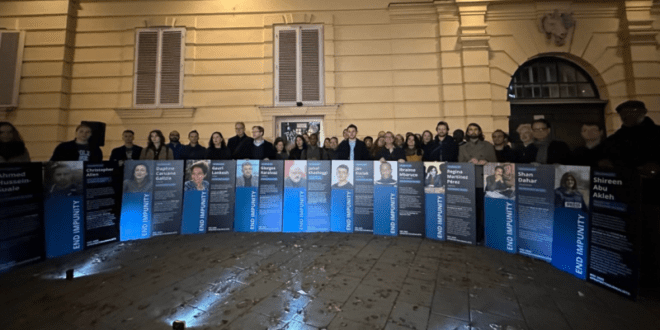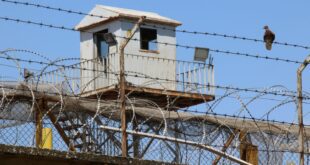2022 witnessed a devastating decline in journalists’ safety, as 66 journalists and media workers worldwide were killed in connection with their profession, according to International Press Institute (IPI) data. This figure marks a steep increase from the total of 45 journalists killed in 2021.
Spiraling attacks against journalists in Mexico as well as Russia’s full-scale invasion of Ukraine were leading factors behind the rise in journalist killings. Fourteen journalists were killed in Mexico in 2022, the deadliest year for the country’s media since 2017. Meanwhile, eight journalists were killed covering Russia’s war in Ukraine, including both Ukrainian and foreign reporters.
This year saw other shocking attacks on journalists, such as the fatal shooting of Al Jazeera journalist Shireen Abu Akleh by Israeli forces while reporting on an Israeli raid in the West Bank in May.
States’ failure to ensure justice for attacks on journalists continues to provide fertile ground for violence against the press. IPI calls on authorities around the world to end impunity for these crimes and to ensure the protection of journalists.
Documenting killings of journalists since 1997
Today, the IPI global network published its annual report on journalist killings. In 2022, the IPI Database of Killed Journalists documented a total of 66 journalists who were killed in connection with their work or lost their lives on assignment. Eight were female and 58 were male.
IPI’s database categorizes journalist killings into five categories. There were 39 targeted killings in 2022, meaning that journalists were murdered due to their work. Seven journalists were killed while covering armed conflict, compared to three cases in this category in 2021. Two were killed while covering civil unrest, and two lost their lives while on assignment. In the remaining 16 cases, the circumstances and motive behind the journalist’s killing remain unconfirmed, but a work-related killing cannot be ruled out.
Since 1997, IPI has been documenting the killings of journalists, editors, and photojournalists, as well as other media workers who directly contribute to news content, such as camerapersons. IPI’s statistics are based on the organization’s regular monitoring of attacks on journalists. In addition, IPI works closely together with its network of members and with local journalism organizations to assess whether the killing of a journalist was likely to be work-related or not.
Tragic year for journalists in Latin America and the Caribbean
Latin America and the Caribbean was the deadliest region for journalists in 2022. This year marked one of the darkest periods for the Mexican press in recent memory. With 14 documented killings, Mexico remained the deadliest country in the world for journalists, even compared to active war zones such as Ukraine.
In most of these cases, journalists were targeted deliberately due to their work. Journalists working in remoter regions of the country were in particular danger. Many of the killed journalists, like Heber López Vázquez, Margarito Martínez, Juan Carlos Muñiz and Jorge Luis Camero, reported on corruption and organized crime. Some of them, like Antonio de la Cruz and Maria Guadalupe Lourdes Maldonado López, received serious threats for their reporting.
There is virtually complete impunity for crimes against journalists in Mexico. Measures taken by the authorities to protect journalists in danger have been inadequate. Moreover, despite promises made by Mexican President Andrés Manuel Lopéz Obrador to “end corruption and impunity”, the president has instead become known for his verbal attacks on journalists. In February, he aggressively rejected a resolution passed by the European Parliament condemning the recent rise of violence against the press in Mexico.
“The horrific slaughter of journalists in Mexico shows that the criminals are in control, as they can act with impunity”, IPI Executive Director Frane Maroević said. “The Mexican government has to act now to protect journalists who are risking their lives and to reinstate the rule of law, ensuring justice for those who were killed.”
In addition to Mexico, an alarming number of journalists were killed in Haiti, where a total of eight journalists lost their lives due to their profession. Haiti has recently suffered from political unrest and rising gang violence. Young Haitian journalists Frantzsen Charles and Tayson Lartigue were shot to death by alleged gang members, and journalists Amady John Wesley and Wilguens Louissaint were burned alive by gang members on the outskirts of Haiti’s capital, Port–au-Prince.
Ukraine: Courageous reporters on the front lines
Since Russia started its full-scale invasion of Ukraine in February, IPI has recorded a total of eight journalists and media workers, including Ukrainian and foreign reporters, who are confirmed to have been killed in the line of duty or because of their journalistic profession. There is evidence that up to four more Ukrainian journalists and media workers may have been killed by Russian troops in connection to their profession, though these cases have not yet been verified, and they are not recorded on IPI’s Database of Killed Journalists.
Many of the journalists were killed while covering the war on the front lines, including Frédéric Leclerc-Imhoff, Pierre Zakrzewski, Oleksandra Kuvshynova, Mantas Kvedaravicius, and Brent Renaud, who were killed when their vehicles came under fire in separate incidents. Ukrainian camera operator Yevhenii Sakun died during the Russian bombing of the Kyiv TV tower, and Russian investigative journalist Oksana Baulina was killed after coming under Russian shelling while she filmed destruction at a shopping centre in Kyiv. Ukrainian photographer and documentary filmmaker Maks Levin was killed in the Kyiv region with two shots from small arms by Russian soldiers. According to Ukraine’s Prosecutor General’s Office, Levin was unarmed and wearing a press vest.
Under international law, deliberately targeting journalists working in a conflict zone constitutes a war crime. The IPI network calls on military forces to take all possible steps to ensure the safety of all journalists reporting on the ground. Those responsible for targeting journalists must be held to account.
“This year has again demonstrated the critical and dangerous role of journalists covering wars. Without them, we would only hear from the military”, Maroević said. “IPI honours the memory of all the journalists who lost their lives reporting on the ongoing Russian invasion of Ukraine.”
Violence against journalists remains a global issue
Although the number of killings in Asia and the Pacific declined somewhat – to 11 cases compared to 18 cases recorded in 2021 – the situation in the Philippines took a dark turn with a total of five radio broadcasters killed in 2022. Independent journalists in the Philippines work in a climate of intense hostility and violence, following years of attacks on the press by former president Rodrigo Duterte.
The Middle East and North Africa saw a slight increase compared to last year, with five recorded killings. There were three documented killings in sub-Saharan Africa, including dissident Pakistani journalist Arshad Sharif, who was shot dead in unclear circumstances in Kenya.
Impunity fuels further violence
Impunity for journalist killings continues to drive the cycle of violence against the press. The U.N. Plan of Action on the Safety of Journalists was launched in 2012 to better protect the press and combat impunity, but ten years later it is obvious that not enough has been done. Journalism has become one of the most dangerous professions in the world, and in at least nine out of ten cases, the killers of journalists go unpunished – especially those who ultimately ordered the murders.
On November 2, as U.N. member states convened in Vienna on the International Day to End Impunity, IPI held a public demonstration and launched a new campaign to draw attention to the ongoing global issue of impunity for crimes against journalists. IPI also joined together with press freedom advocates around the world in a preliminary joint Call for Action to all states. The Call for Action includes a series of concrete recommendations to improve journalists’ safety and to tackle impunity in crimes against journalists.
Despite immense international pressure, credible evidence, and eyewitness accounts, the Israeli government has refused to conduct an independent and impartial investigation into the killing of IPI-IMS World Press Freedom Hero Shireen Abu Akleh’s killing and hold those responsible to account. Six months after her death, the U.S. Department of Justice launched an investigation into the killing, and IPI alongside other stakeholders submitted a formal request for an investigation to the International Criminal Court.
Even in the rare cases where there has been progress toward accountability, full justice has not yet been secured. In the murder case of Daphne Caruana Galizia, Malta’s leading investigative journalist, the two hitmen were finally sentenced to 40 years’ imprisonment in October 2022. However, five years after her murder, legal proceedings are still pending against the alleged mastermind, Yorgen Fenech, and two men who allegedly supplied the bomb. The fight for full justice continues, as concrete reforms to protect journalists remain elusive due to the lack of political will of the Maltese authorities.
In many cases, investigations into journalists’ killings stall due to a lack of political will, as the truth might implicate those in power or bring corrupt systems to a fall. Impunity has a chilling effect on press freedom, weakening democracy, preventing journalists from reporting on certain topics, and encouraging more violence towards the media.
“It is outrageous that journalists are killed because they are bringing us information that someone wants to hide. It is unacceptable that families are losing their loved ones and that the public is denied information simply because someone wants to hide the information, because someone is killing the messengers”, Maroević concluded.
“Every single one of these 66 killings is not only an immense tragedy for their loved ones, their friends and colleagues, each killing is an attack on global press freedom.”
————–
This report was published first by International Press Institute (IPI)
 Infowelat Enformasyon Ji Bo Welat
Infowelat Enformasyon Ji Bo Welat




